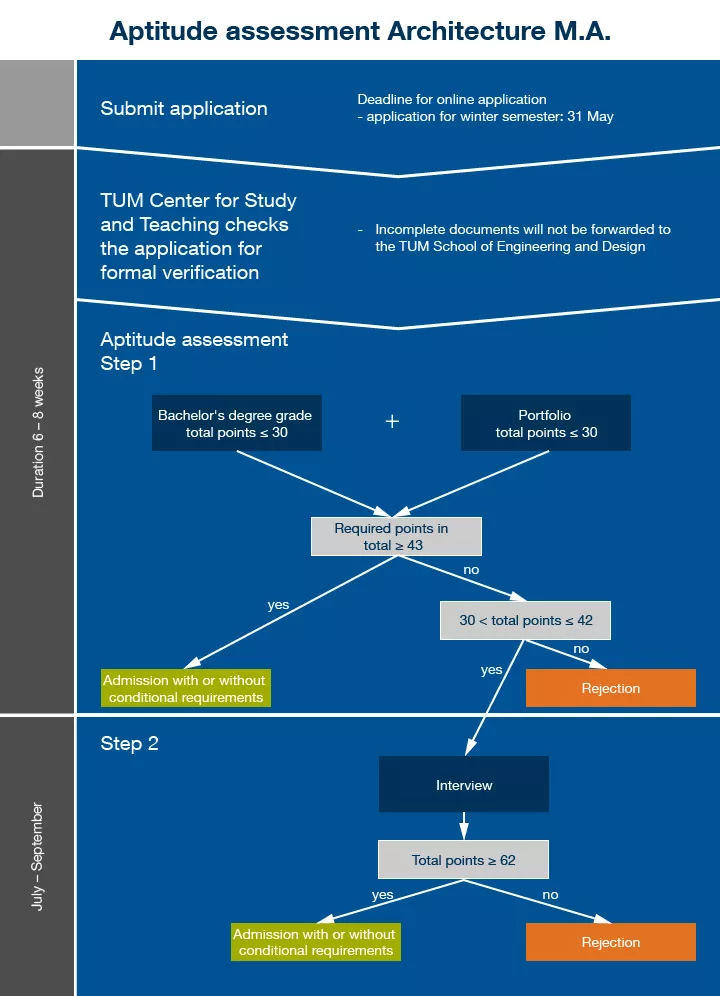Architecture M. A.
Building with wood? Or with membranes? Planning a sustainable urban district? Or deal with questions of architectural theory? It's all possible in the Master of Architecture program. After the fundamental education in the Bachelor´s program, you can choose your own specialization in the Master´s program. Choose from the specializations: "Architectural Technologies", "Cultural Heritage" or "City and Landscape", study in one of the mentoring programs "Wood Architecture", Computational Methods in Architecture" and "Building in Existing Contexts" or individually according to your interests and solve future challenges according to the current state of research.
Become part of a degree program whose overall goal is to preserve and promote cultural diversity and quality of life for all social groups. The Master of Architecture contributes to the preservation and development of a functioning environment for a stable global society.
What you'll learn for your future?
The Master's program in Architecture at the TUM ED offers training for architects that follows the objectives defined in the UNESCO-UIA Charter for Archectural Education. In addition to classical design work, it also offers qualifications for a much broader professional profile. Due to the high degree of freedom of choice, graduates specialize in individual subject areas or focal points according to their individual interests and talents.
Graduates of the specialization "Architectural Technology" have a particular degree of engineering-based knowledge in the subject areas of energy efficiency, building technology, construction, building materials, digitalization, and production methods.
With a degree in the specialization "City and Landscape", graduates can specifically apply interdisciplinary knowledge from architecture, urban planning, and landscape architecture to develop spatial strategies for the transformation of cities, landscapes, and infrastructures. Career opportunities are open to them in independent planning offices or public institutions. Building on a Bachelor's degree in architecture, this specialization allows for supplementary registration in the list of urban planners of the Bavarian Chamber of Architects.
Graduates of the "Cultural Heritage" specialization possess a strong empirical and theoretical knowledge of historical as well as humanistic findings in the field of building. On this basis, they are able to carry out contemporary interventions for the preservation and conversion of the built cultural heritage with respect and precision.
Within the framework of the "Mentoring Programs", graduates have gone through a program of selected elective modules from different fields and disciplines of architecture, individually coordinated with the professors. They usually have highly specialized qualifications with which they specifically cover niches in the field of work of architects.
More information on the M.Sc. Architecture can be found on our TUM Architecture Wiki or in the TUM Architecture FAQ.
Type of Study: Full Time
Standard Duration of Studies: 4 Semester
Credits: 120 ECTS
Main Locations: TUM Munich
Admission Category: Aptitude Assessment
Start of Degree Program: Winter Semester
Application Period: Winter semester: 01.04. – 31.05.
Required Language Proficiency: German
Tuition Fees: for Students from Non-EU Countries
The language of instruction in the Master's degree program in Architecture is predominantly German - please note that you must therefore already have appropriate proof of German at the time of application. Individual elective modules are also offered in English.
The central element is three project papers in which the students deal with design-related problems and questions concerning the built environment. The spectrum of project work ranges from classic design tasks, whose proposed solutions are presented with plans, models, and visualizations, to scientific-theoretical work on design-related questions, which are answered in the form of text work, simulations, or prototypes.
Students must take one project module from the elective catalog "Projects" in each of semesters 1-3. In the majority of the project modules offered, design skills are learned primarily through practical application, i.e. based on architectural design tasks, always accompanied by theoretical and methodological components. However, individual projects also contribute to the development of these competencies through a purely reflective, theoretical examination of synthesis achievements, for example in the project "Theoretical Foundations of Design". The project work is largely done in self-study, in suitable cases, it is organized in groups, which can also be interdisciplinary in composition. Accompanying seminars, site visits or excursions convey the spatial and thematic context of the respective task.
The Master's degree program in Architecture contains one compulsory module. This compulsory module serves as preparation for the Master's thesis and is scheduled for semester 3. All further modules are designed as elective modules to ensure the maximum possible choice in individual subject areas or focal points along individual interests and talents.
The master's thesis in semester 4 deals with current architectural issues, which are usually identified by the students themselves. The identification of a problem or question for the Master's thesis is already planned in Semester 3. The module is compulsory, as the identification and definition of current problems are to be considered part of the research skills. The independent preparation and development of the question for the thesis takes place in consultation with the respective supervisor.
For study plans, visit our ED study wiki
There is no study abroad requirement for the Master of Architecture program. The exception is a possible admission requirement if you have not completed a semester abroad in your Bachelor's program. In this case, you will have to make up the semester abroad at one of our partner universities.
In principle, a semester abroad is also possible in the Master's program in Architecture at one of our more than 90 international partner universities.
Internships are not compulsory in this degree program and are not a prerequisite for admission. There is also no compulsory internship in the Master's program in Architecture itself. Nevertheless, we generally recommend gaining practical work experience at an early stage, even if this is not included in the performance of the Master's degree program.
Please apply through the TUMonline application portal and upload your application documents.
At https://www.tum.de/studium/bewerbung/ you will find general information on the application process and instructions for the applicant portal.
The program always starts in the winter semester. In the summer semester, only lateral entry into a higher semester is possible. You will then start in at least the second semester and must have a corresponding number of credits from the first semester.
The qualification for the Master's degree program in Architecture is proven by:
1. A qualified Bachelor's degree of at least 180 credits acquired in Germany or abroad over at least six semesters. If 180 credits have been acquired at a domestic or foreign higher education institution, missing credits of 60 will be recorded as a requirement and must be proven by the submission of the Master's thesis at the latest. If your certificate shows more than 180 credits, please list the best graded modules amounting to 180 credits in a form provided in the application portal.
2. Passing the aptitude test for the Master's degree program in Architecture. This is a two-stage process in which the aptitude committee checks whether you meet the specific requirements for the Master's degree program in Architecture after you have submitted an official application.
In the first stage, the Bachelor's degree grade and the submitted portfolio are evaluated using a point system. Depending on the number of points achieved, applicants are either admitted immediately, rejected, or invited to a selection interview. The final grade and portfolio are weighted equally.
You can achieve a maximum of 60 points in stage one. Up to and including 30 points, you will receive a direct rejection. If you score 31 to 42 points, you will be invited to an aptitude interview. If you score 43 points or more, you will receive a direct admission.
In the second stage, the points from the aptitude interview (maximum 40 points) are added to the points from stage 1. Admission is then granted from 62 points achieved.
We will be happy to answer all further questions in our Wiki - here you will also find a list of the required application documents.

